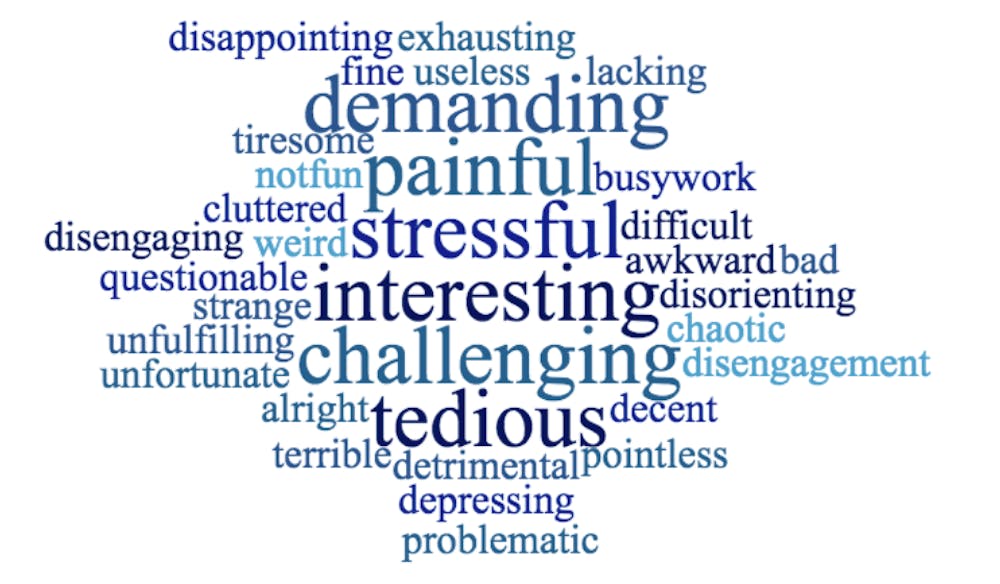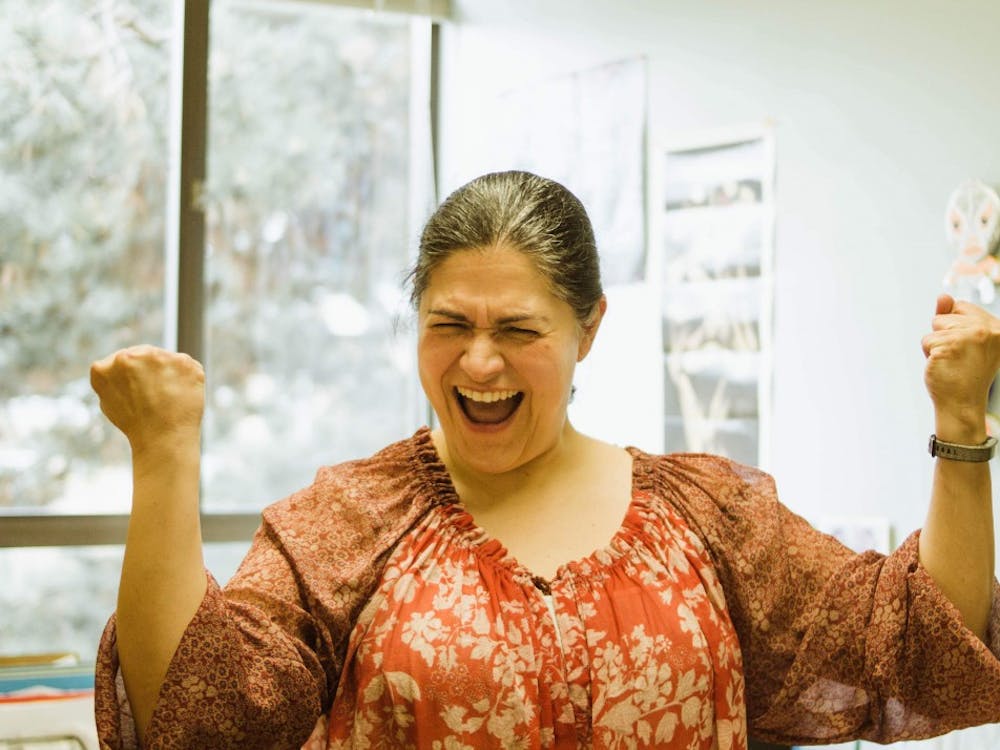On Wednesday, April 1, The Beacon shared a Google form inviting University of Portland students to share their thoughts anonymously on the transition to online classes, with the knowledge that some of their responses may also be published anonymously so that the UP community could have a better understanding of how online classes are progressing.
While this article differs from the usual format of what you’d see in Opinion, we’re also living in an unusual time and are striving to find new ways to engage students and allow them to share their thoughts. The Beacon has heard countless stories and comments from students about online classes, and we wanted to provide students a venue to share those thoughts with the wider community.
We also want to mention that The Beacon rarely publishes content, news or opinion, anonymously. While the information here is not extraordinarily sensitive and is widely shared by students among their peers, we recognize that some students may not have been as candid could their professors and peers have seen their names attached to these comments, as they may fear retribution.
The Beacon asked:
What do you want professors and administrators to know about online classes?
One word to describe online classes?
Anything else you’d like to add?
While it’s worth noting that the people most likely to respond to such a form are the ones with the strongest opinions, the nearly 50 responses convey a significant number of students’ concerns about online classes and reflect opinions held by many others.
Almost every response acknowledged and sometimes praised professors’ efforts, but they also tended to describe increases in workloads, heightened states of anxiety and overall stress, decreases in motivation, and challenges arising from inadequate environments different from the ones they have while on campus with peers and academic resources.
In the interest of fairness, The Beacon wants to offer professors and administrators an opportunity to share their thoughts. What do you want students to know about online classes?
Tell us here through this Google form.
Here’s a selection of undergraduate student responses:
Junior: Engaging in an online lecture takes a lot more self-discipline than going to class ever did. Motivation has gone down SO MUCH for me and for everybody else who I've talked to.
Sophomore: They aren't what we paid for! They are harder to learn from and easier to slack on.
Junior: I wish professors would acknowledge that the world is falling apart. It feels like a lot of my professors are trying to keep our classes basically the same as in-person (same exams, same grading, same assignments, same teaching style, same group projects) without realizing that students are just as stressed as them. We want to be learning, but professors don’t need to pretend they can do online classes easily. I want my professors to admit their stress and cut us some slack. We don’t need to add extra class time through videos and have harder quizzes to make sure students aren’t cheating. Professors need to trust us better and allow us to have a break.
Junior: I wish there was more of an emphasis on engagement. It’s much harder to stay engaged watching a lecture online and not being in the classroom. I think more small group work and other interaction would help.
Senior: I want professors and administrators to know that online classes are actually harder than in-person class. Just because we are attending class from our homes doesn't make anything easier. I also think we have heard a lot about how we need to learn to adapt in these difficult and uncertain times, but don't really feel that some professors and especially the administration have adapted. It shouldn't be solely the students’ responsibility to adapt. Along with that, with everything being so unknown right now it can be really difficult to find the purpose in a lot of what we are doing. A lot of students have loved ones in the front lines or who are sick/in the high-risk category, so school isn’t the most important thing on their mind.
Sophomore: Online (classes) are going well, however I wish we could get a little more time on our work since it is harder to communicate with professors and a lot of us students have time zone differences.
Junior: In general, online classes have been more confusing, more difficult, and I find them difficult to learn from. This isn't to say they've been total failures—we HAVE been having classes, after all. I've found my professors' willingness to adapt and try new things to be commendable and I've appreciated their effort to problem-solve as we go and think on their feet … A compassionate, powerful and merciful response is required by the University of Portland if it is what it says it is. And, I am also grateful for everyone who has done their very best to do what they can to make this all work.
Sophomore: The chaos going on around us makes it immensely difficult to balance the same amount of work. I personally get energy from my peers and learn best when surrounded by others, without this, I've been drained and frankly have been feeling stupider since being home.
Senior: Honestly, they’ve been okay. But as someone who has high anxiety that leads to troubles with focusing, it is not ideal. When I would have to go to class, that was most of motivation to do work, but now there is no motivation even in the classes I find really interesting. I love the content but it’s difficult to do assignments without having gone to class and having that accountability. I am struggling to catch up. There’s too much going on to focus and have the same if not more work than without a global pandemic. Professors should limit the work.
Senior: Not all of my professors are efficient enough to hand out constructive material for online classes and I have been unable to grasp class concepts. I don’t think most professors understand that switching to online classes makes learning and basic assignments take twice as long as they would’ve been prior to switching. So, when professors assign the same amount of reading, writing assignments, and homework with online forums and numerous video lectures then students are unable to complete things on time. I also don’t think professors realize how valuable their live commentary and anecdotal responses (are) to strengthen a student’s understanding. This is lost in pre-recorded lectures. Apart from online classes, not having a study environment like the library has really made it difficult to detach from my daily life in order to focus on my classwork.
Junior: I want professors and administrators to know that it isn't fair to assume that all students have the resources that are available on campus (printers, scanners, fast wi-fi, laptops, etc.).
Sophomore: Online classes don’t constitute a reason to give us more school work. We are all grieving the loss of “normal,” so I understand the stress on their end too. But I feel busier than before from classwork … For me, my ability to focus comes from being in class and being able to interact with my professor and other students. At home, I just sit around on my laptop. I don’t have extracurricular activities or my job to keep myself busy throughout the day anymore, so I am unable to tire myself out, and I feel like that just adds onto the stress of online classes. It’s the only thing I do. It’s kind of depressing.
Junior: That we are struggling to keep up with everything extra that is thrown at us, both with school and our home life. We know that professors are in the same situation, but some of them are still treating it as if we are on campus.
Junior: I find the transition to online classes similar to the transition from living with your parents to living on your own: All of the responsibility and none of the structure. Some people thrive with a lack of structure. They flourish in an environment that is mentally engaging but peacefully recharging. Others, like myself, need structure. Many times, external accountability, such as getting ready and showing up for class, is a driving motivator to start the day and tackle tasks. Though, now with the absence of this external accountability, I am challenged to grasp integrity, resourcefulness, and grit as motivators to reach similar goals as before. While I now ask for more assignment extensions than I have in my entire time at UP, I am grateful to have new valuable insights: Silence is a gift and a torment; exercise is always a reliable habit; and (unfortunately) being 100% extroverted during quarantine is not an acceptable excuse for turning in assignments late.
Junior: Be patient, be flexible, and that this is a hard change for us all.
Dora Totoian is a reporter and the Opinion editor of The Beacon. She can be reached at totoian20@up.edu.








